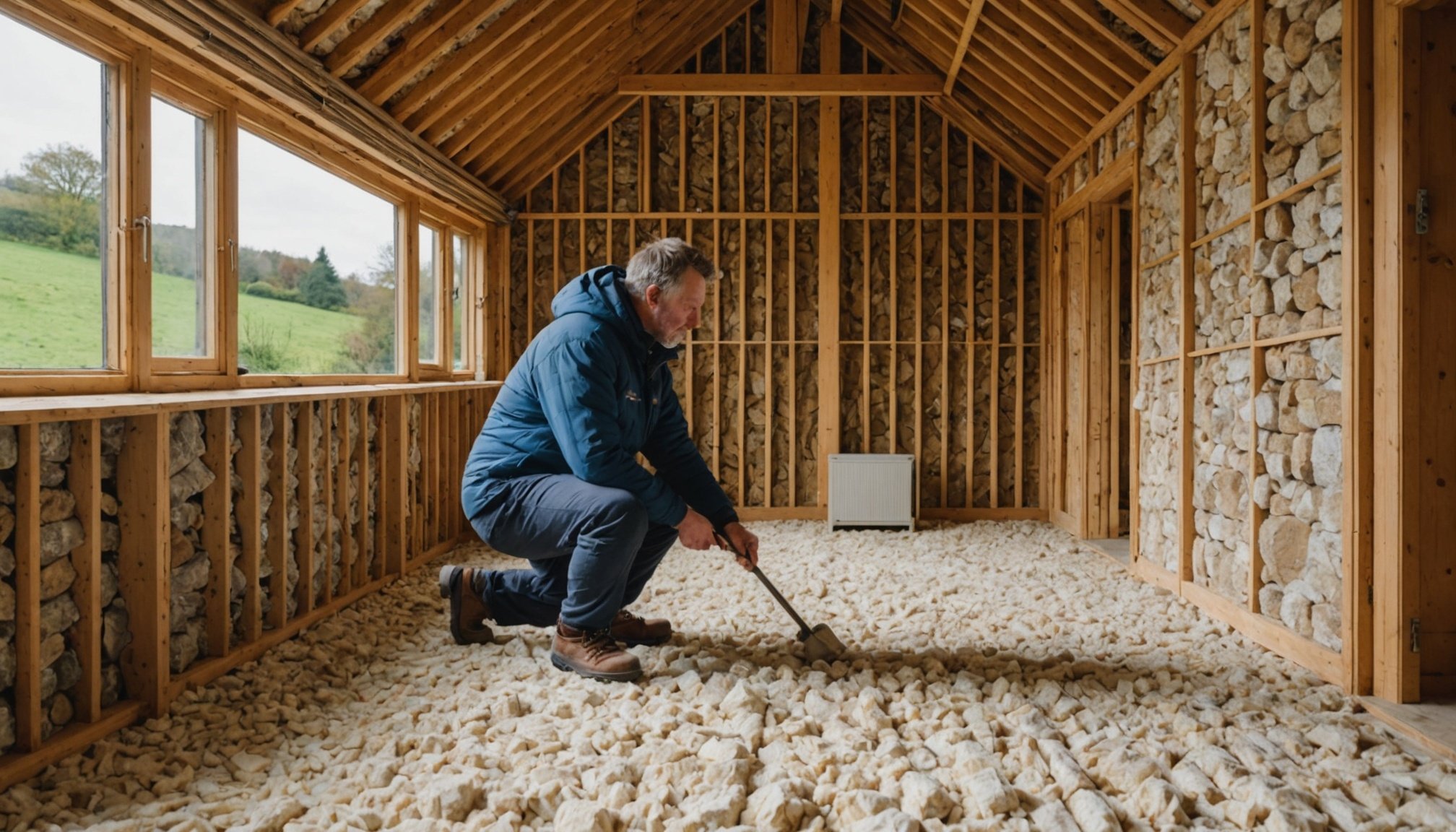Overview of Sustainable Insulation Options
The adoption of sustainable insulation is crucial in lowering the environmental impact of homes. Eco-friendly materials play a pivotal role in enhancing energy efficiency and reducing the overall carbon footprint. Insulation choices significantly influence energy consumption. Opting for materials that are both effective and sustainable can lead to considerable energy savings, reducing dependency on non-renewable resources.
Why Choose Eco-Friendly Insulation?
Eco-friendly insulation offers a variety of benefits. Primarily, it enhances energy efficiency, which can lead to significant cost savings on heating and cooling. By reducing the energy demand, these materials contribute to a lower carbon footprint, supporting global efforts towards sustainability.
A lire aussi : Discover the unique benefits of weo® sunbreakers
Leading Sustainable Insulation Materials in Wales
In Wales, several sustainable insulation options are gaining popularity:
-
Sheep Wool: A natural, renewable resource highly effective in regulating temperature and humidity. It’s both safe and biodegradable.
Dans le meme genre : Creative Strategies for Maximizing Vertical Space in Your Cozy Leicester Kitchen
-
Cellulose: Made from recycled paper, it offers excellent thermal performance and is a fantastic choice for reducing waste.
-
Cotton (Denim) Batts: Recycled from cotton clothing, it provides good thermal insulation and is safe for home use due to its non-toxic nature.
These materials showcase a commitment to sustainability while ensuring energy efficiency. Choosing the right insulation involves considering both the environmental benefits and specific performance needs.
Hemp Insulation
Hemp insulation is increasingly popular due to its impressive thermal performance and sustainable nature. Made from natural materials, it offers an excellent alternative to traditional insulation, keeping homes warm in winter and cool in summer. The thermal performance of hemp is due to its unique structure, providing excellent resistance to heat transfer.
On the environmental front, hemp is notable for its ability to grow quickly and efficiently, sequestering carbon dioxide in the process, which helps in reducing the carbon footprint. Using natural materials like hemp for insulation contributes to healthier indoor air quality, as it doesn’t release harmful particles or gases into the home environment.
Sourcing and applying hemp insulation is straightforward in regions like Wales, where the climate suits the growth of hemp crops. There are several suppliers that provide hemp insulation in various forms, such as rolls, batts, and loose fill, making it easy to find a product that meets specific construction needs. Whether building anew or renovating, embracing hemp as an insulation material is a choice that supports both effective thermal management and environmental responsibility.
Sheep’s Wool Insulation
Sheep’s wool insulation is a highly breathable material, ideal for homes looking to manage moisture levels efficiently. This insulation naturally absorbs and releases moisture, providing excellent moisture control, which inherently reduces the risk of mold formation. As a bonus, it regulates indoor humidity, contributing to a healthier living environment.
Beyond its moisture management capabilities, sheep’s wool also offers superior soundproofing and thermal insulation advantages. Its unique structure traps air efficiently, which not only dampens noise effectively but also provides excellent thermal properties. This means it maintains warmth during colder months and keeps spaces cooler during summer, making homes more comfortable while potentially reducing energy costs.
Furthermore, sheep’s wool is an environmentally friendly option; it’s renewable, sustainable, and biodegrades naturally. For homeowners interested in using sheep’s wool insulation, local suppliers are a practical option. They can offer tailored advice, products, and installation services to suit specific needs. Installation of this insulation is relatively straightforward and can usually be managed by professional services available in most areas. By selecting sheep’s wool insulation, homeowners invest in a sustainable solution that promotes a comfortable, quiet, and healthy living space.
Cellulose Insulation
Cellulose insulation is an eco-friendly and efficient choice for insulating homes. Made from recycled materials like newspapers and cardboard, its production process emphasizes sustainability, reducing waste and conserving resources. The material is treated with non-toxic fire retardants, ensuring safety while maintaining environmental standards.
One of the standout benefits of cellulose insulation is its energy efficiency. It acts as an excellent thermal barrier, creating a more stable and comfortable climate indoors. This translates into reduced heating and cooling costs, as less energy is needed to maintain desired temperatures. Additionally, cellulose insulation offers soundproofing qualities due to its dense composition, further enhancing home comfort.
When considering the installation of cellulose insulation in Wales, costs can vary depending on the amount used and the installation method. Generally, it’s cost-effective compared to other insulation types, and financial incentives may be available for choosing sustainable options.
Sourcing cellulose insulation in Wales involves choosing reputable suppliers who often provide guidance on the best application practices. This way, you can ensure you’re making a sustainable choice that’s both energy-efficient and cost-effective. Whether upgrading an old property or insulating a new build, cellulose insulation offers both practical and environmental advantages.
Straw Bale Insulation
Straw bale insulation is an integral part of natural building methods, celebrated for its exceptional effectiveness in providing thermal mass. Thermal mass refers to the ability of a material to absorb and store heat energy, thereby naturally regulating indoor temperatures. This property makes straw bale constructions incredibly energy-efficient, reducing reliance on artificial heating and cooling systems.
The use of straw, a renewable and abundant material, significantly minimizes the environmental footprint associated with construction. Unlike traditional insulation materials, straw is biodegradable, making its use in building both eco-friendly and sustainable. This approach aligns with the growing movement towards sustainable living and the reduction of carbon emissions.
Practical applications of straw bale insulation are numerous, from new residential builds to extension projects for enhancing energy efficiency in existing structures. Additionally, many local experts specialize in straw bale construction, offering invaluable insight into its installation and maintenance. Their expertise ensures that straw bale buildings meet all necessary standards while optimizing the material’s natural benefits.
Exploring straw bale insulation as an option could influence not only individual comfort and energy bills but also contribute positively to environmental sustainability goals.
Cotton Insulation
Cotton insulation offers an eco-friendly option for those looking to improve their home’s thermal efficiency. Made primarily from recycled cotton, this type of insulation not only optimises energy usage but also promotes sustainability. Unlike traditional materials, cotton insulation is composed of approximately 85% recycled content, making it an environmentally responsible choice. Its insulation effectiveness is noteworthy, providing excellent thermal resistance due to its dense fibre composition.
Recycled cotton is often sourced from the textile industry, utilising otherwise wasted materials. This helps to reduce landfill waste and lower overall environmental impact. Additionally, cotton insulation naturally resists mould and pests without the need for harmful chemicals.
When considering installation, cotton insulation is available in pre-cut batts or loose-fill, suitable for various applications such as walls, ceilings, and attics. This versatility allows for straightforward incorporation into existing structures. Some regions may offer locally sourced options, providing the opportunity to support regional manufacturers while reducing transportation-related emissions.
Overall, choosing cotton insulation aligns with a broader eco-conscious approach, combining energy efficiency with environmental responsibility. This makes it an ideal option for those seeking to minimise their carbon footprint without compromising on quality.
Comparisons and Cost Considerations
Choosing the right insulation material requires a detailed cost analysis of several aspects, including sustainability and performance. Each of the five major insulation materials offers distinct advantages when considered against these metrics. For instance, fiberglass is often lauded for its affordability and good thermal performance, while cellulose offers an environmentally friendly option due to its recycled content.
In the short term, fiberglass may appear to be the most cost-effective choice due to its low upfront cost. However, cost analysis over a longer period might tell a different story when considering energy efficiency and potential savings on heating and cooling bills. More expensive options like spray foam, although pricier initially, can offer significant savings in the long run due to superior insulating properties, contributing to reduced utility bills.
When selecting an insulation material, consider your specific needs. Selection advice should factor in climate, budget, and environmental concerns. If sustainability is a priority, materials like cellulose or wool might be preferable. For those prioritising long-term performance over initial cost, spray foam could be the best bet. Always balance immediate costs with potential future savings to make a well-informed decision.
Local Suppliers and Installation Services
Finding the right sustainable insulation suppliers in Wales requires pinpointing reputable local businesses. Choosing locally sourced materials reduces your carbon footprint and supports community economy. Here are some notable suppliers for eco-friendly insulation:
- Green Suppliers Wales focuses on delivering high-quality, sustainable materials for various building types.
- Eco Materials Cymru provides renewable and recycled insulation solutions that meet industry standards.
When it comes to installation services, aligning with experts who practice eco-friendly methods ensures your insulation performs optimally. Professional services often include an initial consultation, bespoke solutions, and efficient installation using renewable materials.
Supporting local businesses in this field not only enhances your home’s energy efficiency but also promotes the use of sustainable practices within your community. Opting for these suppliers and services can reduce environmental impact while championing local economy growth—a win-win for you and the planet.
Moreover, engaging with professionals allows for precision in installation, reducing waste and potential errors. It maximises both the environmental and financial benefits of your investment. Always verify the credentials of installation teams to ensure they meet sustainable standards, guaranteeing your project’s eco-friendly success.






